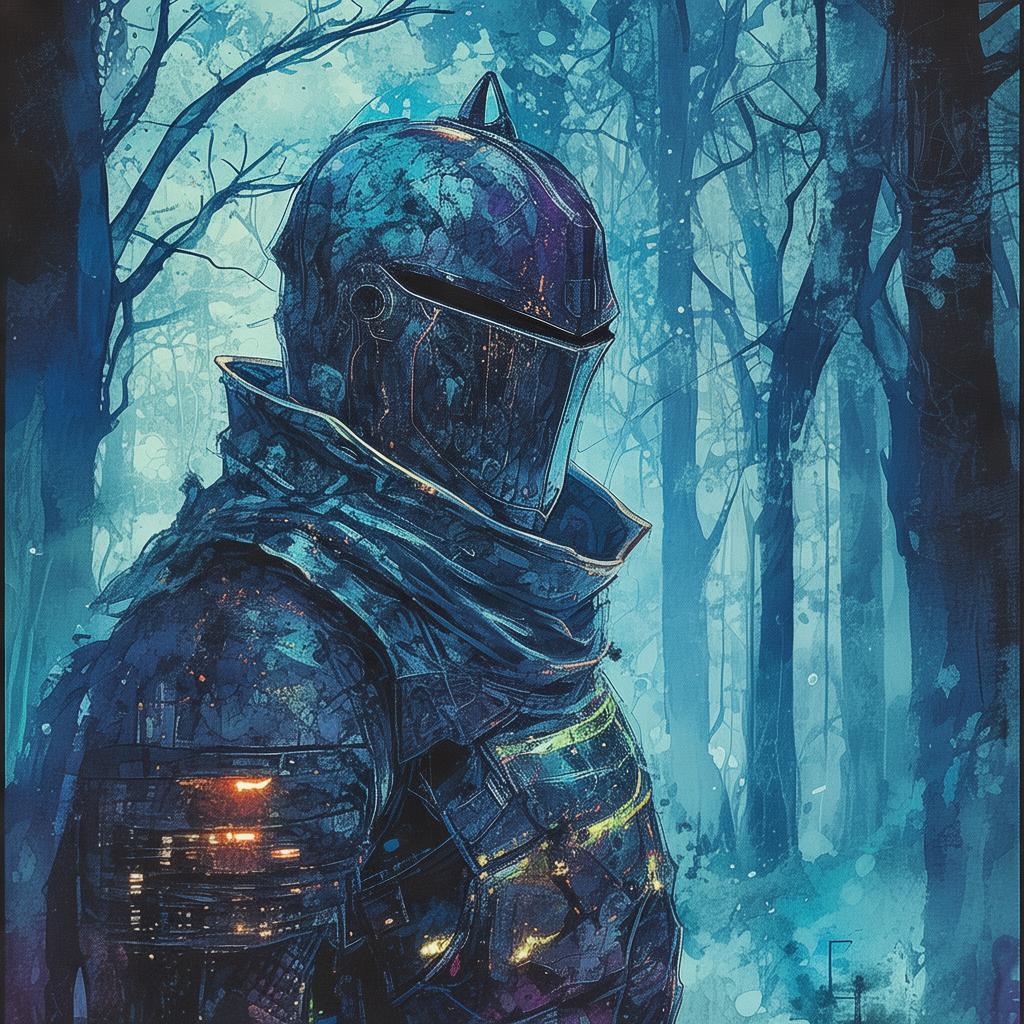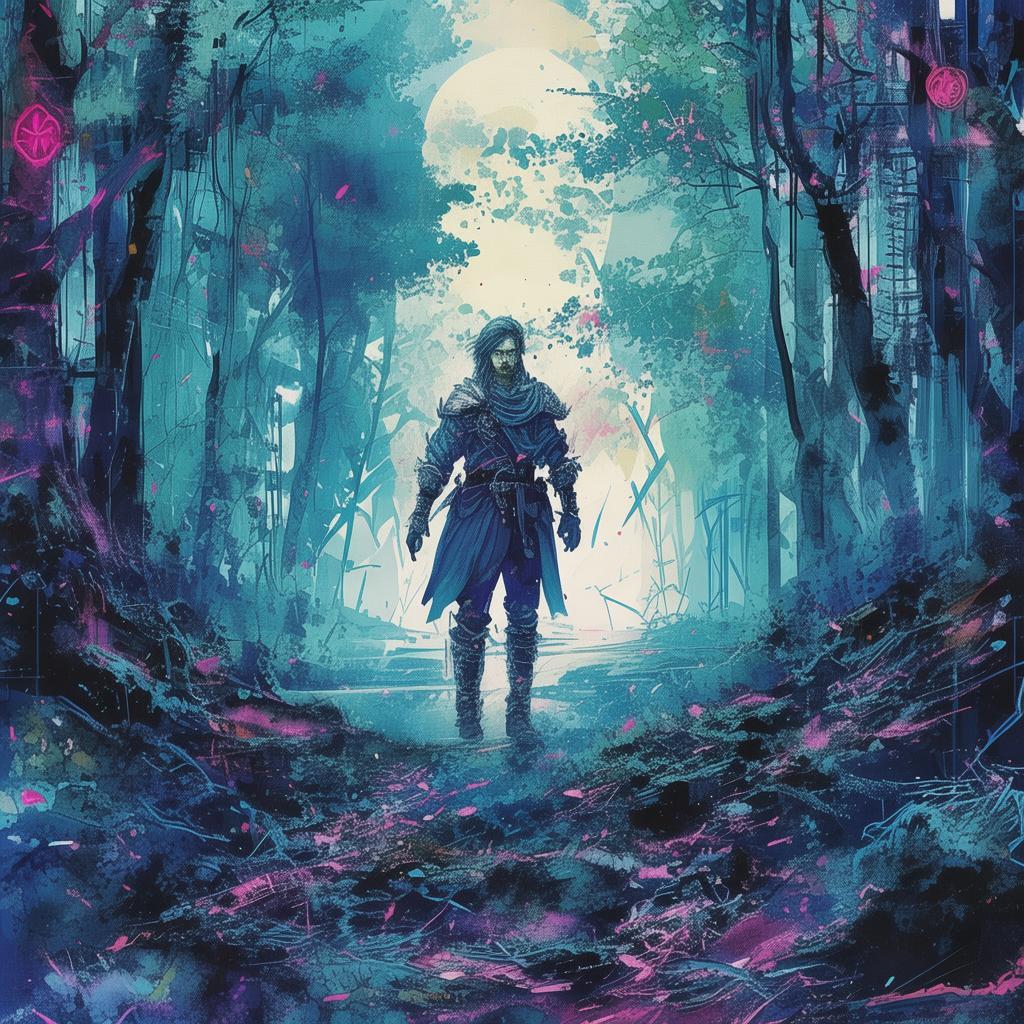The Betrayal of Jingyuetan: The Labyrinth of Shadows
In the ancient kingdom of Jingyuetan, a legend whispered through the ages: the labyrinth within the moonlit forest, where shadows danced and truths lay hidden. The labyrinth was said to be the resting place of an ancient hero, a guardian of the realm, whose last words were a warning to those who dared to enter: "Beware the labyrinth of shadows, for betrayal lies within its walls."
The hero's tale was one of great valor and sacrifice, but it was a story that had been lost to time, its details buried under the weight of history. The kingdom had long since forgotten the labyrinth's dangers, and the legend of the hero was but a bedtime story for the children.
In the year of the moon's descent, a young warrior named Liang emerged. He was the son of the kingdom's most revered knight, a man who had once been the greatest hero of Jingyuetan. But Liang's heart was heavy with the weight of a secret his father had never shared: the truth behind the labyrinth's creation.
It was said that a great betrayal had occurred within the labyrinth's walls, one that had led to the hero's downfall. Liang's father had been part of that betrayal, a fact he had carried with him until his last breath. Driven by a desire for redemption and the truth, Liang decided that he would venture into the labyrinth to uncover the past and bring closure to his family's legacy.

The night of the moon's descent was chosen, as it was said that the moon's light would reveal the labyrinth's secrets. With a heavy heart, Liang set out into the forest, guided only by the light of the moon and the memory of his father's last words.
The labyrinth was a marvel of ancient engineering, its walls carved from the very stone of Jingyuetan. As Liang ventured deeper, he was surrounded by an oppressive atmosphere, the shadows of the forest swirling around him like vengeful spirits. The air grew thick with the scent of decay, and the whispers of the past seemed to echo through the labyrinth's passages.
Liang soon encountered the first of the labyrinth's guardians, a twisted figure of stone and moss, its eyes hollow and its arms outstretched as if to embrace him. The guardian spoke no words, but its presence was a chilling reminder of the dangers that lay ahead. Liang's hand trembled as he reached out to push past the guardian, and the stone figure seemed to crumble away, revealing another path.
Each turn of the labyrinth brought new challenges. Some were physical, such as the shifting floors and collapsing walls, while others were more insidious, such as the illusions and trickery that tested Liang's resolve. He had to confront his own fears and doubts, as well as the specters of the past that haunted him.
In the heart of the labyrinth, Liang found a chamber adorned with ancient symbols and inscriptions. In the center stood an old, weathered chest, its lid sealed with a heavy stone. As Liang approached, the walls seemed to close in, and the shadows intensified. He knew that this was the heart of the labyrinth, the place where the truth lay hidden.
With a deep breath, Liang pried open the chest. Inside, he found a scroll and a small, ornate box. The scroll was a detailed account of the betrayal that had led to the hero's downfall, revealing the true nature of the treachery that had unfolded within the labyrinth's walls. The box, however, contained something far more personal: the hero's final message to Liang's father.
As Liang read the message, his heart swelled with emotion. It was a letter of forgiveness, written by the hero in the moments before his death. The hero had known the truth all along, and he had chosen to protect Liang's father from the burden of guilt. Liang realized that his father had lived with a heavy heart, carrying the weight of a secret that he had never shared.
The climax of Liang's journey came when he encountered the true mastermind behind the betrayal. It was none other than the king himself, a man who had sought power at any cost. The king had manipulated events and orchestrated the hero's downfall, but Liang was determined to bring him to justice.
In a climactic battle, Liang fought the king, using his father's teachings and the wisdom he had gained in the labyrinth. With each strike, he felt the weight of the past lifting from his shoulders. Finally, Liang subdued the king, and the labyrinth began to crumble around them.
As the labyrinth collapsed, Liang was forced to make a choice. He could take the king's life, or he could spare him. In a moment of profound clarity, Liang chose to spare the king, recognizing that he was a man who had been driven by ambition and fear. The king was led away in chains, his fate left to the justice of Jingyuetan.
With the labyrinth gone, the shadows that had lingered within it seemed to dissipate as well. Liang emerged from the ruins, the moon's light shining down upon him. He felt a sense of peace and fulfillment, knowing that he had faced his father's past and had chosen a path of redemption.
Liang returned to the kingdom, where he shared his story and the hero's message of forgiveness. The kingdom was united by the tale of the labyrinth's guardian and the young hero who had braved the shadows to bring the truth to light. The legend of Jingyuetan was reborn, a tale of heroism, betrayal, and redemption that would be told for generations to come.
✨ Original Statement ✨
All articles published on this website (including but not limited to text, images, videos, and other content) are original or authorized for reposting and are protected by relevant laws. Without the explicit written permission of this website, no individual or organization may copy, modify, repost, or use the content for commercial purposes.
If you need to quote or cooperate, please contact this site for authorization. We reserve the right to pursue legal responsibility for any unauthorized use.
Hereby declared.









